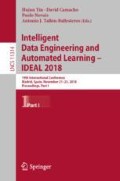Abstract
We present a method for improving the prediction accuracy using multiple predictive algorithms. Several techniques have been developed to tackle this issue such as bagging, boosting and stacking. In contrary to the first two that, usually, generate homogeneous ensembles of classifiers, stacking techniques have demonstrated success using heterogeneous ensembles. In our method, we adopt the stacking mechanism. Several models are generated using different learning algorithms. Forward stepwise selection is implemented to link each instance to its appropriate learning model. Experiments with three datasets benchmarked with four learning schemes show that this novel method improves prediction accuracy and can serve as a bridge to transfer knowledge between tasks given the same feature space but different data distributions.
This work is funded by Project “TEC4Growth - Pervasive Intelligence, Enhancers and Proofs of Concept with Industrial Impact/NORTE-01-0145-FEDER-000020", a project financed by North Portugal Regional Operational Programme (NORTE 2020), under the PORTUGAL 2020 Partnership Agreement, and through the European Regional Development Fund (ERDF). We also thank STCP - Sociedade de Transportes Colectivos do Porto, SA, for the data used in this work.
Access this chapter
Tax calculation will be finalised at checkout
Purchases are for personal use only
References
Pan, S.J., Yang, Q.: A survey on transfer learning. IEEE Trans. Knowl. Data Eng. 22(10), 1345–1359 (2010). https://doi.org/10.1109/TKDE.2009.191
Baghoussi, Y., Mendes-Moreira, J., Emmerich, M.T.M.: Updating a robust optimization model for improving bus schedules. In: 2018 10th International Conference on Communication Systems Networks (COMSNETS), pp. 619–624, January 2018
Day, O., Khoshgoftaar, T.M.: A survey on heterogeneous transfer learning. J. Big Data 4(1), 29 (2017). https://doi.org/10.1186/s40537-017-0089-0
Wang, C., Mahadevan, S.: Heterogeneous domain adaptation using manifold alignment. In: Proceedings of the Twenty-Second International Joint Conference on Artificial Intelligence - Volume, IJCAI 2011, vol. 2, pp. 1541–1546. AAAI Press (2011).https://doi.org/10.5591/978-1-57735-516-8/IJCAI11-259
Shi, X., Liu, Q., Fan, W., Yu, P.S., Zhu, R.: Transfer learning on heterogenous feature spaces via spectral transformation. In: 2010 IEEE International Conference on Data Mining, pp. 1049–1054, December 2010
Wu, X., Wang, H., Liu, C., Jia, Y.: Cross-view action recognition over heterogeneous feature spaces. In: 2013 IEEE International Conference on Computer Vision, pp. 609–616, December 2013
Saenko, K., Kulis, B., Fritz, M., Darrell, T.: Adapting visual category models to new domains. In: Daniilidis, K., Maragos, P., Paragios, N. (eds.) ECCV 2010. LNCS, vol. 6314, pp. 213–226. Springer, Heidelberg (2010). https://doi.org/10.1007/978-3-642-15561-1_16
Gao, J., Fan, W., Jiang, J., Han, J.: Knowledge transfer via multiple model local structure mapping. In: Proceedings of the 14th ACM SIGKDD International Conference on Knowledge Discovery and Data Mining, KDD 2008, pp. 283–291. ACM, New York (2008)
Wang, H., Yang, Q.: Transfer learning by structural analogy. In: Proceedings of the Twenty-Fifth AAAI Conference on Artificial Intelligence, AAAI 2011, pp. 513–518. AAAI Press (2011). http://dl.acm.org/citation.cfm?id=2900423.2900505
Schmidhuber, J.: Evolutionary principles in self-referential learning. On learning how to learn: the meta-meta-meta...-hook. Diploma thesis, Technische Universitat Munchen, Germany, 14 May 1987
Brazdil, P., Giraud-Carrier, C.G., Soares, C., Vilalta, R.: Metalearning (2009)
Wolpert, D.H.: Stacked generalization. Neural Netw. 5(2), 241–259 (1992)
Gama, J., Brazdil, P.: Cascade generalization. Mach. Learn. 41(3), 315–343 (2000)
Seewald, A.K., Fürnkranz, J.: An evaluation of grading classifiers. In: Hoffmann, F., Hand, D.J., Adams, N., Fisher, D., Guimaraes, G. (eds.) IDA 2001. LNCS, vol. 2189, pp. 115–124. Springer, Heidelberg (2001). https://doi.org/10.1007/3-540-44816-0_12
Duch, W., Maszczyk, T., Grochowski, M.: Optimal support features for meta-learning. In: Jankowski, N., Duch, W., Grabczewski, K. (eds.) Meta-Learning in Computational Intelligence. Studies in Computational Intelligence, vol. 358, pp. 317–358. Springer, Heidelberg (2011). https://doi.org/10.1007/978-3-642-20980-2_10
Author information
Authors and Affiliations
Corresponding author
Editor information
Editors and Affiliations
Rights and permissions
Copyright information
© 2018 Springer Nature Switzerland AG
About this paper
Cite this paper
Baghoussi, Y., Mendes-Moreira, J. (2018). Instance-Based Stacked Generalization for Transfer Learning. In: Yin, H., Camacho, D., Novais, P., Tallón-Ballesteros, A. (eds) Intelligent Data Engineering and Automated Learning – IDEAL 2018. IDEAL 2018. Lecture Notes in Computer Science(), vol 11314. Springer, Cham. https://doi.org/10.1007/978-3-030-03493-1_78
Download citation
DOI: https://doi.org/10.1007/978-3-030-03493-1_78
Published:
Publisher Name: Springer, Cham
Print ISBN: 978-3-030-03492-4
Online ISBN: 978-3-030-03493-1
eBook Packages: Computer ScienceComputer Science (R0)

